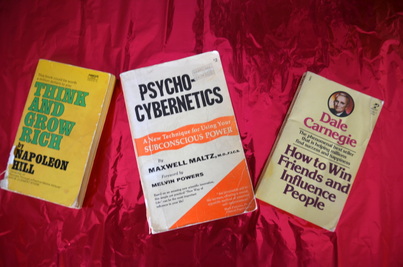
While parenting books are popular with moms, they are rarely read by dads. Despite this, I took a chance and wrote a book just for dads knowing it might not fly off the shelves. After all, there is no sex, no vampires, not even a recipe or a diet plan, the usual fare of successful books. But I can’t think of a more important topic for those that could use its guidance.
I, myself, didn’t read parenting books as a young man. But I think I would have had if,
1) it occurred to me at all and,
2) they spoke plainly, simply, and to the point.
Notice how tattered the books are in the photo? They got that way by frequent revisits, and every time I revisit, I find something I missed the previous dozen or more times. Many of my parenting skills came from reading these wonderful books and others, then applying their lessons to everyday life with children.
For instance, if you read “How to Win Friends and Influence People” to be a better salesman, just read it again with the mindset of fathering - and the principles still work. As an example of what I mean, Dale Carnegie tells us in Part Three, “You Can’t Win an Argument”. This lesson teaches us that even if we are right, we will not win anyone over by embarrassing them or putting them in a corner, thereby sapping their self-esteem and alerting their defenses.
As a father, I apply this pearl of Mr. Carnegie’s wisdom to parenting. Of course, as a parent, you have different goals and responsibilities to your children, but how many times does your child come to you with claims that are difficult to believe or have opinions that you know are wrong but harmless. It’s good for your children to feel like they know something you don’t. They also like to be inventive and valued. Therefore, go along with them sometimes instead of constantly correcting them. It keeps the avenue of communication open without a toll road (constant correction) to pass through.
In the classic, “Think and Grow Rich”, a book about achievement and financial success, Napoleon Hill has chapters on faith, imagination, organized planning, persistence and more. How could you not become a better man and father by reading and heeding this advice? Hill also has 11 Major Attributes of Leadership. The first four are 'Unwavering courage', 'Self-control', 'A keen sense of justice', and 'Definiteness of decision'. A man could become a better father by understanding just these 4 of the 11 Leadership Attributes.
One of my favorite self-help books is “Psycho-Cybernetics” by Maxwell Maltz, written in 1960. There’s no real mention of parenting in his book, yet the lessons within can always be applied to raising kids. One section in the book is called “Stop—Look—Listen!” Here, Maltz cautions us to be aware of our present environment, the sights, sounds, and odors which you will miss if you don’t leave the past behind or stop yearning for the future.
Stop—Look—Listen is a vitally important concept for a parent to understand - for both celebrating the good times and fixing the bad. It’s easy to cruise control through crises or issues, never really understanding them. It’s even easier to avoid them altogether. Instead, you sometimes have to stop and look at the situation, and listen for clues because they are out there.Acknowledgement is an activity done in the present, not a passive thought. Both pats on the back and corrective actions need to take place as soon as possible (which I learned in another book and applied at home).
When I wrote my book “The Power of Dadhood”, it was based very much on the lessons of books not focused on fatherhood. There is so much to learn from so many sources to be used in so many ways. A well-rounded and balanced person makes a good parent.The lessons are all around you, if you just stop, look, and listen...and read!
So why read a book like mine, tailored to dads? Because I talk about "Dadhood" and these proven principles all in one place. But don't ever let that stop you from reading the classics!





